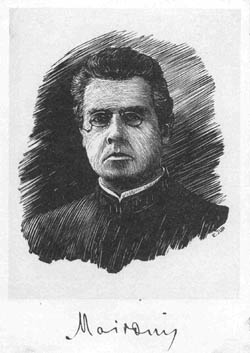Editors of this issue: Violeta Kelertas
Copyright © 2002 LITUANUS Foundation, Inc.

|
LITUANUS
LITHUANIAN QUARTERLY JOURNAL OF ARTS AND SCIENCES
Volume 48, No.3 - Fall 2002
Editors of this issue: Violeta Kelertas ISSN 0024-5089
Copyright © 2002 LITUANUS Foundation, Inc. |

|

MAIRONIS (JONAS MAČIULIS)
1862-1932
MAIRONIS
MY BIRTHPLACE*
MANO GIMTINE
There, where the Nemunas flows softly
Through the hills and dales,
My poor brothers are lamenting
Many ages past.
There my mother rocked my cradle
Singing songs of woe,
With her breast so full of sorrow
Secretly it flows.
Here forests sighed and remembered
Times so long ago,
When our people were astounded
To awake enslaved.
There old castles lie in ruins
High upon the hills,
Heroes' bones are slowly crumbling
Grieving in their graves.
Here I grew up and felt deeply
All my sorrows,
There came to love them and to cherish
The sorrows of the oppressed.
O, those painful thoughts
Do press me,
Just like rusty iron
With unhealing wounds.
PROTECT, O MOST HIGH**
APSAUGOK, AUKŠČIAUSIAS
Protect, O Most High, our beloved land,
Where lie our homesteads, our fathers' graves!
Your fatherly hand is mighty and strong!
We are your weary children forever.
Do not abandon, O Almighty, our dear homeland
Merciful and mighty throughout the ages.
SUMMER NIGHTS***
VASAROS NAKTYS
Quiet, balmy nights of summer;
Every leaf still, quietly sleeping.
All is calm now, all is quiet,
Only the stars are twinkling, burning.
All lie sleeping, all are quiet,
Earth is enfolded in dreams of love:
They carry my soul, carry and cradle it
So full of longing and inspiration.
Summer nights, quiet and balmy,
Luring the heart to take its rest!
Countless the sorrows our earth is full of,
Only you are calm and unchanging.
Calm and unchanging! With magic power
Lulling the earth with dreams of sweetness!
Why can't you still all of my longing?
Why am I sad then, why am I yearning?
O, to embrace the whole of creation,
Longing to love God in His heaven,
O to possess this beauty eternal!..
Why am I sad then, why am I yearning?
Translated by Ona Mikaila
*
First published in 1895; set to music and sung as a folk song. Sixteen variants have been discovered.
**
Ending of a longer poem, first published in 1902. Set to music by Lithuanian composer A.
Kačanauskas and sung as a hymn, it became especially popular among the Lithuanian
diaspora.
***
First published in 1920written in the form of a rondo with repetitions. Set to music, it became a favorite Lithuanian song.